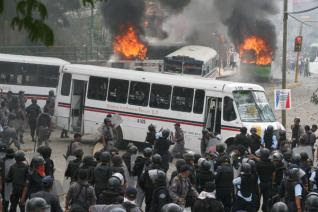I just came back from a short trip to Oaxaca. A city, a state which has been a long theme of inspiration for me during my time in Mexico. This was my 5th visit to Oaxaca.
Oaxaca, for me, is so much: it is art (a disproportionate amount of incredible Mexican artists are from Oaxaca), indigenous diversity, pain, beauty and conflict; not to mention the extraordinary cuisine of this state.
Here is a photo from the Sierra Juarez mountains taken from last year on the Day of the Dead in Mexico - in the very region where Mexico´s first indigenous president, Benito Juarez, was born;
During 2006, Oaxaca lived through a low-intensity war or social conflict, in which over 200 people were arbitrarily detained with charges and many more were detained for shorter periods, as well as dozens of people tortured and during this period 26 deaths including that of a foreign journalist:

And now, this week, I was privileged to be in a public press forum in Oaxaca this week called "Mexico in the eyes of the United Nations", as this week mexico was examined in the Universal Periodic Review (UPR) of the Human Rights Council in Geneva.
We debated about the aspects of international law mechanisms and their relevance for social struggles such as those in Oaxaca.
We showed the video of the Mexican Ministry of the Interior speaking about the advances in indigenous rights and poverty erradication in Mexico before the Human Rights Council.
On witnessing the lies that his own government was making towards the international community , one older indigenous man even got to talking with tears in his eyes.
I drank a few mezcals (like tequila, but more complex and stronger) with one of the most amazing social activists I have met. Before the social conflict of 2006 she was doing her own thing as a mother of a family and completing a masters. then came June 2006 and she was shocked by what was happening. Something has to be done, she said. the next day she put out an announcement convoking lawyers from everywhere. The next day over 60 lawyers arrived in response to her announcement. A committee of lawyers was formed, and then kept reducing in size, as there were ones who were in it for personal and political gain. After more than 2 years, this social activist now has a small juridical and activist committee basically made up of 3 women. thanks to these 3 women, some 109 prisoners from the political conflict have been freed from prison. And all of this without negotiating with authorities, but rather using stictly legal recourses to obtain unconditional liberty for these prisoners.

Being an international lawyer it is sometimes so hard to insist on the importance of utilizing such intangible mechanisms as UN treaty bodies and other such instruments. However, I am convinced that it is due to the international attention lent to Oaxaca and the many international observation missions during and after the conflict of 2006that some of the human rights defenders in the region are now better supported, visibilised and backed up.
That´s not to say the situation is still not very grave in Oaxaca.
But its great to see the city alive again, art and beauty radiating as always.
And I give you a song, by Lila Downs from Oaxaca: More than anything else, this video shows you Oaxaca!
It´s waiting for you, my dear sisters!
